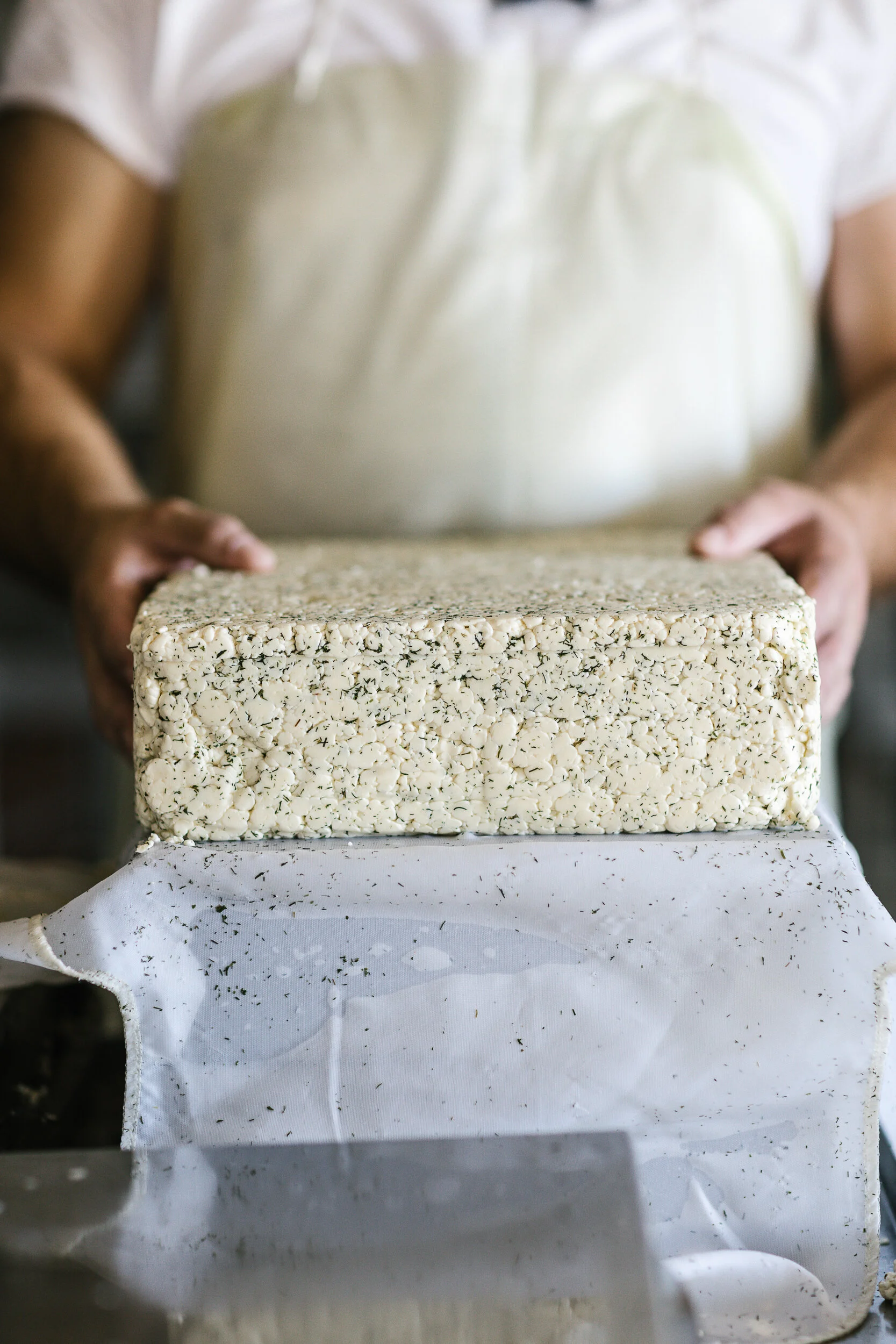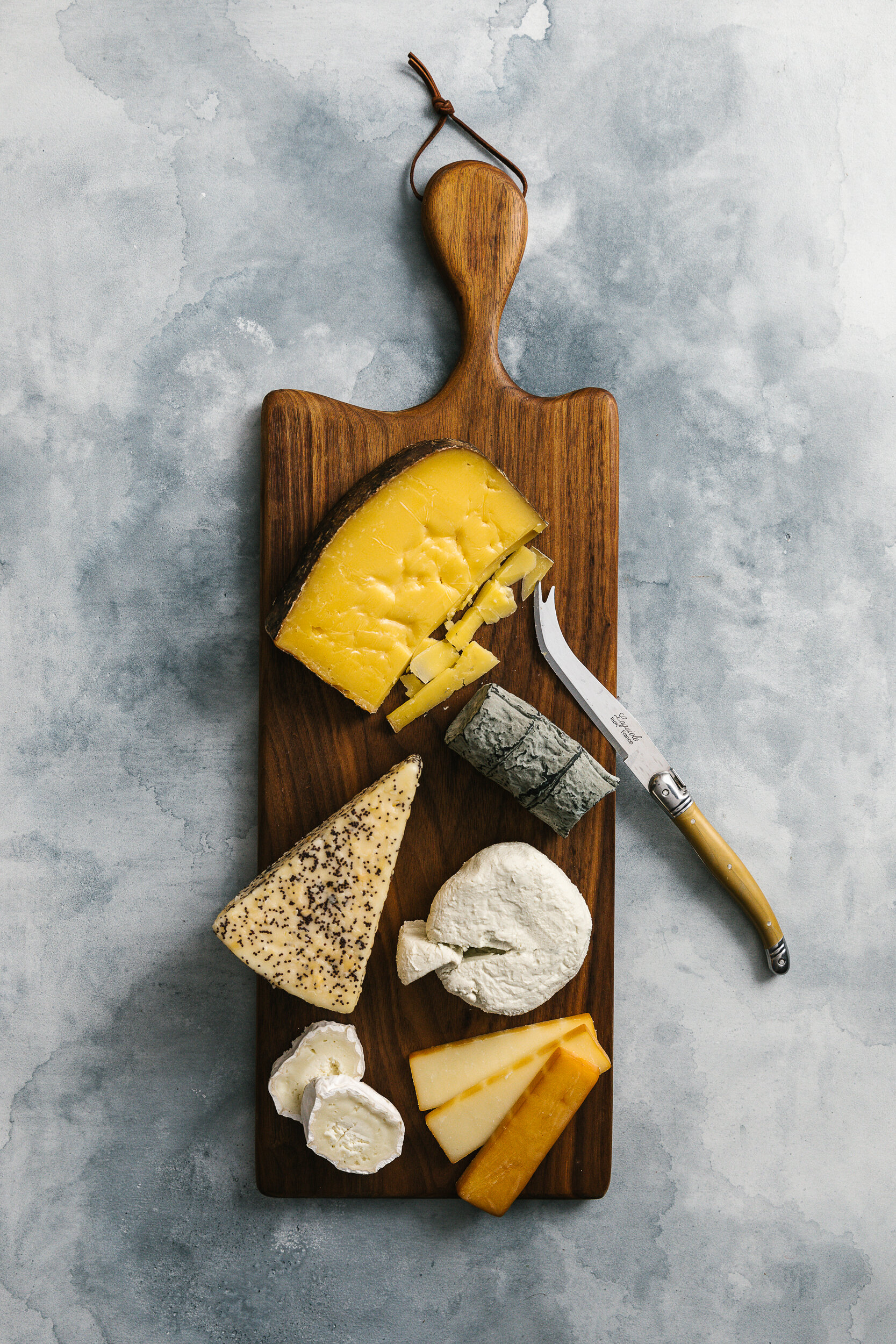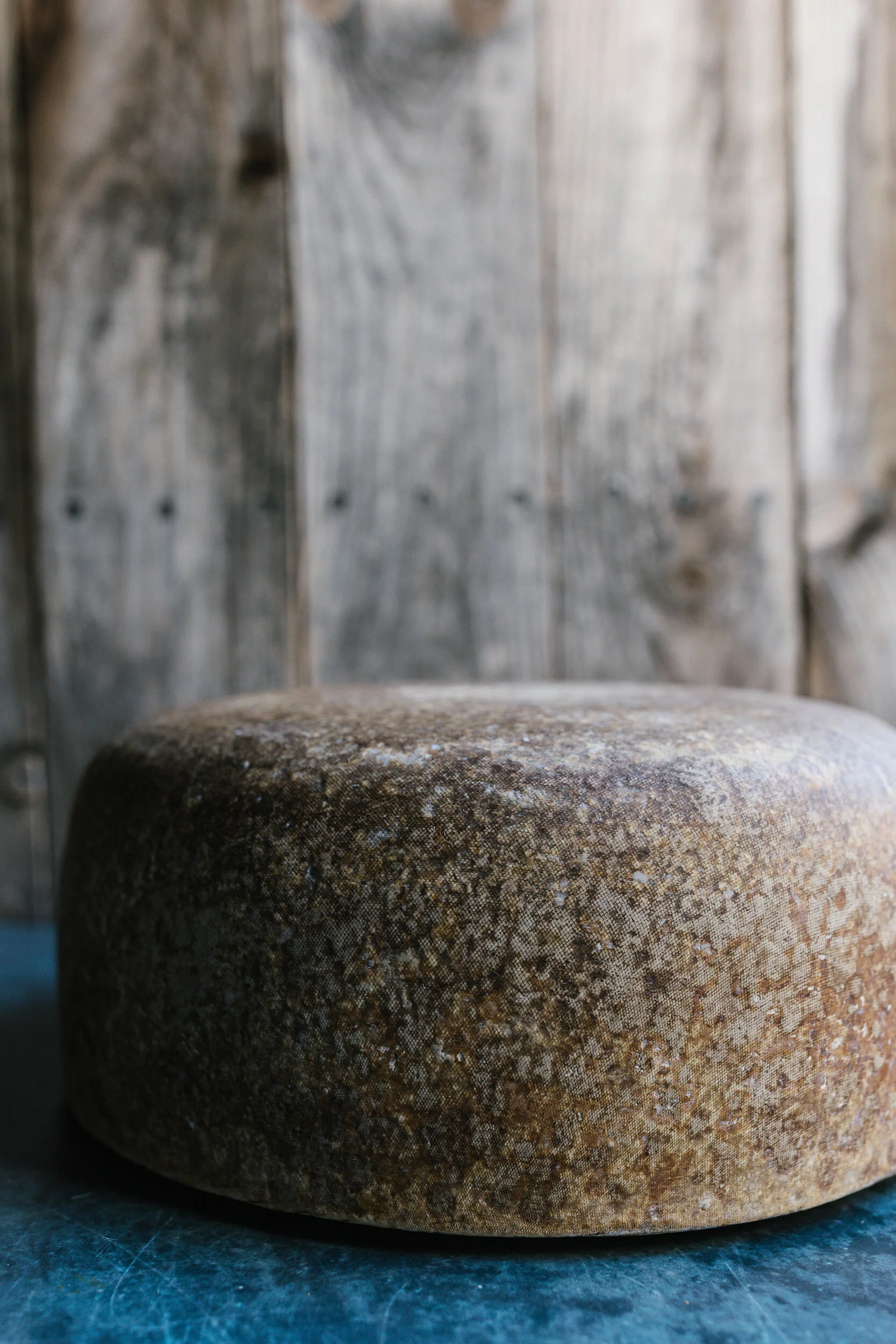Preserving Dairy: Cheesemaking—and Selling—in Central Mass
Photos by Linda Campos
Phinney Farmstead is the latest in the line of artisan cheeses developed by Rachel Scherer at her Little White Goat Dairy in Orange. The name links it to the important and historic role of cheese in preservation of local dairies.
“I found the recipe for it in a booklet written by the Cornell University Extension Service in 1889,” Scherer says. She notes that the booklet explains how a frugal farm wife could preserve milk over the winter by making cheese. In a nod to the historical significance of her product and the way of life it preserves, Scherer named her cheese after the Phinney family who originally farmed the land where she now lives.
Preservation has a new significance to those who make and market cheese in Central Massachusetts these days. Some are struggling to preserve their operations in an economy hit hard by the global pandemic.
“I've seen firsthand how much work it is for these local cheesemakers,” says Simone Linsin, owner of Pecorino, a cheese shop in Grafton. “They love what they do, but it’s so hard. They face such risks. It’s an ongoing struggle.”
Pam and Ray Robinson, owners of Robinson Farm Cheese in Hardwick, can attest to that struggle. The couple are retiring after 10 years as cheesemakers and a lifetime as dairy farmers.
“We were trying to do it all: raise the cows, milk them and make the cheese,” says Pam Robinson. The couple was “ready for retirement and our children didn’t want to take on the business,” she adds. The farm, cows and cheesemaking operation are for sale; their award-winning aged cheeses are still available for purchase through their website.
The Robinsons’ Alpine-style farmstead cheeses are made from certified-organic, raw milk produced by their herd of grass-fed cows. The couple practiced the traditional method of affinage—washing and turning the big wheels of cheese by hand as they aged on racks in a temperature-controlled cheese cave.
The clever names of their cheeses, such as Robinson Family Swiss, reflect both their practice of cheesemaking and the terroir of Central Massachusetts where the cheese is made. A Barn Dance, another example, is a play on the French Alpine cheese Abondance. The Robinsons’ old European style of cheesemaking is labor intensive; the production, equipment and requirements for organic certification are expensive. These costs are reflected in the price, but it puts the local company at a disadvantage when compared to the price of many cheeses made in Europe, where the cheese industry is heavily subsidized.
At Pecorino, Linsin notes, “We can import an artisan cheese from France, have it flown over here and it still costs several dollars a pound less than a locally made cheese.”
For local cheesemakers, whose primary customers were restaurants, the impact of COVID-19 was swift and brutal. They saw their profits plummet when restaurants were shut down in March. That was the case for Bob and Debby Stetson, owners of Westfield Farm in Hubbardston. “Overnight it knocked out 85% of our business,” Bob says.
Working with a staff of six, the Stetsons used to process 1,500 pounds of goat cheese every week. Since March, they have cut back on staff and production, focusing on retail and online sales of their award-winning fresh goat cheeses and surface-ripened blue cheeses.
Westfield Farm cheeses have won multiple awards from the American Cheese Society. Classic Blue Log is their flagship cheese and their White Buck goat cheese is similar to the elegant French Bucheron.
“We used to be in specialty shops and top-end restaurants,” Stetson says. “Now we’re in cheese shops, farm stands and supermarkets.” With an uptick in retail business by the fall of 2020, the cheesemaker’s outlook and profit margin had improved.
“It’s a sustainable business but not as profitable as it was at the beginning of 2020,” he adds.
The Stetsons have been making fresh goat cheese and aged blue cheese for 25 years. Goat cheese “used to be an exotic item and we spent our time educating customers,” says Stetson. “Now there’s a much bigger market for goat cheese, but it’s also much more competitive.”
Despite the challenges, cheesemaking is rewarding, he adds. “I didn’t realize how much pleasure people get from eating our cheese. I’ll pick up the phone and it’s someone calling to tell me how much they like our cheese and ‘thanks for making it.’ At the end of the day, I feel a sense of accomplishment. There’s something tangible that I’ve made and it makes people happy.”
At Mullahy’s, an artisan cheese and specialty food shop in Hudson, Katie Quinn, owner and Certified Cheese Professional, agrees. “I want the experience of buying and eating cheese to be approachable and fun,” she says. That was difficult for several months, when sales were limited to online and pickup was curbside.
Before COVID, Quinn conducted in-person cheese tasting classes; during the pandemic shutdown, she partnered with Kith and Kin, a local restaurant and brewery, for virtual tastings. She also collaborated with neighboring small businesses to market Mother’s Day gift boxes.
“I’m a big believer in supporting local products and local businesses,” says Quinn. Her own 5-year-old shop is one of several small businesses in a downtown that has become a food and beverage destination. “There really is a spirit of community,” she adds. “We all look out for each other.
Cooperation and collaboration are keys to survival for the small businesses involved in cheesemaking and marketing, says Beth Falk, president of the Massachusetts Cheese Guild and co-owner of Mill City Cheesemongers in Lowell.
“I’ve seen a lot of creativity and some good collaborations among members of the Cheese Guild,” Falk says. For example, one cheesemaker offered to be the point of shipping for another farm that didn’t have shipping capability.
At Smith’s Country Cheese in Winchendon, co-owner Alyssa Catlin says she was overwhelmed by the support from local customers during the dark days of the COVID shutdown last spring.
“They bought gift cards, stocked up on cheese and even stopped in to ask how we were doing,” Catlin says. “We added some grocery items to our store and partnered with Crust Bakery in Worcester to create meal kits made from local ingredients.”
Smith’s Country Cheese, which also has a store in the Worcester Public Market, has added online ordering to its website. “You have to adapt or go out of business,” says Catlin.
Smith’s, the area’s biggest producer of farmstead cheese, has been owned by Alyssa and her husband, Jake Catlin, Jake’s brother, Mike and his wife, Leah Catlin, since 2016 when they purchased the farm and cheesemaking operations from the original owners, David and Carol Smith.
The Catlins make aged cheddar and Gouda and hickory smoked Gouda, as well as 10 flavored Gouda spreads. Every week their herd of 200 Holstein cows produces 11,000 pounds of milk resulting in 3,500 pounds of cheese. Walking through stacks of giant cheese wheels on 10-foot-high shelves in the temperature- and humidity-controlled aging room, Catlin observes, “It’s a library of cheese.”
Because the Catlins produce everything onsite, “We are able to offer a handcrafted product at an affordable price,” Alyssa explains. Smith cheeses are sold in supermarkets and cheese shops throughout New England.
“We want to be known as New England’s everyday cheese,” says Catlin. “We’re not just fancy cheese, we’re affordable.”
Another local cheese business was built on the popularity of the iconic grilled cheese sandwich. Over the past five years, Terri Goulette’s “Say Cheese” food truck has been all over Central Massachusetts, from the Brimfield Antiques Market to breweries in Worcester County and the Agronomy Farm Vineyard in Oakham.
The combination of an enthusiastic welcome from Goulette herself at the ordering window, an imaginative menu—the favorite Pickleback Sandwich pairs cheddar, bacon and dill pickles—the aroma of melting cheese and the satisfying crunch of grilled bread draws long lines of customers wherever the appropriately orange food truck parks.
“We’re humbled at people’s reaction,” Goulette says. “Our goal is to make the best sandwich as quickly as possible.”
Goulette started the business as a way to supplement her income; she was working at an auto body shop. “I thought I’d be working weekends in summer. I never expected such a strong following.”
Although she’s no longer working at the auto body shop, the pandemic has made the future uncertain.
“Last year, I was focused on upcoming events,” Goulette explains. “‘When St. Patrick’s Day comes, we’ll be OK,’ then the St. Patrick’s Day celebrations were canceled. So, I focused on the Brimfield opening; when it was canceled, I cried. Now I’m not counting on future events. We’re working Wednesdays to Sundays to pay our bills. We’re going into the winter not counting on money that might not be coming.”
At the Little White Goat Dairy, Scherer is using experience she gained selling her cheeses during the pandemic to fashion a way forward. Because of COVID restrictions, cheesemakers and merchandisers are not allowed to offer samples to customers.
Looking to the future, “I have to be more creative and adventurous in cheesemaking,” Scherer says. “I’m now making cheeses that people won’t get to taste first before they decide to buy. We and our customers will go into this adventure together, trying new cheeses.”
chevre.com
littlewhitegoatdairy.com
mullahys.com
pecorinografton.com
robinsonfarmcheese.com
saycheeseft.com
smithscountrycheese.com
This story appeared in the Winter 2021 issue.





